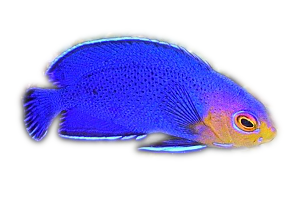
By Bob Goemans

Dear Bob,
I have an alga/plant problem that I haven't been able to find a way to control, never mind eliminate for 2 years. Its called Neomeris annulata or Caterpillar Weed. I have unsuccessfully searched online for a solution to this problem. There are no known predators of this alga, tangs and rabbitfishes nibble, but don't eat close to enough to control it. Royal urchins also don't seem to eat it. I can spend 7 hours manually removing it with forceps but the small ones are still there and grow back. While it doesn't directly hurt anything, it does grow around the base of corals and shades them out. It also sucks down the calcium, which it uses in its base/stem structure, making it hard to keep the calcium levels where I would like for a stony coral tank.
I started using a skimmer about 3 months ago. I skim my 155-gallon setup (125 gallons main and 30 gallons refugium) with an AquaC EV-400 skimmer so that shouldn't be the problem. The refugium has feather Caulpera and blade grass growing in it. I started doing 40-gallon water changes every two weeks to try to help dilute anything that the skimmer doesn't get. As it's a reef I don't have many fish so I rarely feed the tank but when I do use frozen cyclops and frozen mysis shrimp targeted to the corals. Fish include a sailfin tang, basslet, possum wrasse, and mandarin goby. I use a Korallin calcium reactor filled with A.R.M media which I think might be part of the problem. I started in the last 3 months to mix in dolomite to augment magnesium levels. A.R.M leaches some PO4 so I have it running straight into the skimmer so hopefully it gets removed before reaching the alga. Phosphate (PO4) for the tank reads between 0.01 and 0.03 on the color chart but closer to the 0.01. Calcium 400, Magnesium 1200 - 1250, pH 8.3 rock solid, Alkalinity 14.2 KH. All test kits are Salifert except Magnesium, which is SeaChem. The tank has been setup since summer of 2001 and has over 170 pounds of live rock. I run carbon every once and a while but it only stays in the filter for 2 to 3 weeks, then is removed. I have been slowly lowering the alkalinity to get it back in range not really sure why its so high but stopped using the buffer with new saltwater and that is helping lower it. I was thinking about using Korallins PO4-minus to help but not sure if I should. Any suggestions would be greatly appreciated as I am at a loss with this plant.
Thank you for any help,
Keith
Barrington, NH
Hi Keith,
Thanks for your well-written letter and in fact, I show Neomeris annulata on my website's 'Algae Page.' This 'page' has almost 200 different algae photos and lists the organisms that eat some of them. Unfortunately, as you'll see if you visit my web page, nothing is listed there that will devour this calcareous alga. The reason for this is that it chemically protects itself from predation with a mixture of terpenes, e.g., brominated sesquiterpenes, which are located in its thallus tips. Therefore, except for some nibbling by parrotfish in the wild, this alga can remain a tough situation to resolve once it gets going in aquaria!
With that said, since this is a calcareous, aragonite containing green alga, your alkalinity is twice what it should be, and just maybe this alga is finding this helpful in your situation. Recommend some large water changes to bring it more in line as to where it should be for your calcium level, i.e., 2.0 - 2.5 meq/l level. Could be the reduction in alkalinity might slow the growth of this alga, yet said reduction would not harm calcareous corals in your aquarium since calcium and alkalinity would then be in balance as it is in natural seawater. I would continue to mechanically remove as much as possible, and try some Mithrax crabs, e.g., Mithrax sculptus (Emerald crab) and urchins, which might feed on very 'new' shoots. Nevertheless, I would not get overly joyful these recommendations will resolve this situation, but they might be worth a try.
As for most calcium reactor media, especially those containing shell material, some resulting phosphate in their effluent is the norm. And the most efficient way to resolve that is to allow the reactors effluent to be drawn into a canister filter using a phosphate removing compound, e.g., ROWAphos. That way, you'll be assured it will be removed, as the skimmer, as good as the one you have, will not remove it as efficiently as would a canister filter with this type media! And if you need some information on how to set up the canister filter, contact me. And if you go this road, simply have the drip from the calcium reactor right near where the water to the canister filter is taken in.
Furthermore, I've had this alga in some of my aquariums, but it dissipated on its own after a few months. This may indicate that in an aquarium with high water quality and parameters such as alkalinity, calcium and pH in proper balance and well skimmed, it does not have what it needs to continue its expansion. It seems that in the wild this weed is found in shallow nutrient laden areas, so that should be an indicator that some improvements in water quality should be considered.
Hopefully, some of the above was helpful, but otherwise, it's the best I can suggest.
Bob